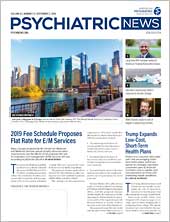Revised ICD-10-CM codes for 2019, released by the National Center for Health Statistics (NCHS), take effect on October 1. The list includes new, updated, or deleted codes for diagnoses in ICD-10-CM, including some 65 codes related to mental health conditions in DSM-5. All practitioners and payers must use the codes.
Coding updates are typically made to provide greater diagnostic specificity, which in turn impacts reimbursement levels.
NCHS is a federal agency within the Centers for Disease Control and Prevention, which oversees the ICD-10-CM. The ICD-10 Coordination and Maintenance Committee, a federal committee co-chaired by a representative from NCHS and from the Centers for Medicare and Medicaid Services, approves proposed changes to ICD on a yearly basis.
The diagnoses are listed alongside two columns—one column lists the codes that can be used through September 30, and the other column lists the new codes that become effective October 1. Two versions of the table are provided—one listing the codes in numerical order and the other listing them in the order in which they appear in DSM-5.
This year’s coding changes impact two diagnostic categories in DSM-5: (1) factitious disorder in the somatic symptom and related disorders and (2) substance withdrawal in the substance-related and addictive disorders. Overall, these changes allow clinicians to provide a greater level of specificity. The details of these changes are presented below, as explained by Michael First, M.D. He is a professor of clinical psychiatry at Columbia University and a research psychiatrist in the Division of Clinical Phenomenology at the New York State Psychiatric Institute. Additionally, he is a member of the DSM Steering Committee, the editorial and coding consultant for DSM-5, and the chief technical and editorial consultant on the World Health Organization’s ICD-11 revision project.
Factitious disorder involves falsification of medical or psychological signs and symptoms or induction of injury or disease associated with identified deception. DSM-5 introduced new subtyping: factitious disorder imposed on self vs. factitious disorder imposed on another. Prior to this coding change, clinicians did not have an option to code subtypes because the only available code was F68.10. While F68.10 will remain in use for factitious disorder imposed on self, the new code, F68.A factitious disorder imposed on another, allows the clinician to make the distinction between these two subtypes. Of note, factitious disorder imposed on another is diagnosed in the perpetrator, not the victim.
The coding change specific to substance withdrawal reflects the need to differentiate between individuals who experience substance withdrawal in the presence of a use disorder and individuals who experience substance withdrawal while taking medications as prescribed and under appropriate medical supervision.
Given that substance withdrawal typically occurs in the context of a moderate to severe substance use disorder, the DSM-5 coding note for substance withdrawal only offers the ICD-10-CM code for substance withdrawal occurring in the context of a comorbid moderate or severe substance use disorder. For example, the coding note for opioid withdrawal instructs the clinician to use F11.23, noting that “the ICD-10-CM code indicates the comorbid presence of a moderate or severe opioid use disorder, reflecting the fact that opioid withdrawal can only occur in the presence of a moderate or severe opioid use disorder” (DSM-5, page 548). Substance withdrawal, however, commonly occurs in individuals taking medications exactly as prescribed. Because the DSM-5 substance use criteria reflecting the development of tolerance and withdrawal are not considered to be met for individuals taking such substances solely under appropriate medical supervision, these individuals are not considered to have a diagnosis of a substance use disorder unless at least two of the other substance use criteria are met. Thus, the diagnostic codes indicated in the coding note do not apply.
The omission is being corrected in DSM-5 so that the diagnostic codes for substance withdrawal that develops in individuals taking medications under appropriate medical supervision no longer indicate that there is a comorbid moderate or severe substance use disorder. The new codes for substance withdrawal that are being added for cases of withdrawal with no comorbid use disorder include F11.93 for opioid withdrawal; F12.93 for cannabis withdrawal; F13.939 for sedative, hypnotic, or anxiolytic withdrawal without perceptual disturbances; F13.932 for sedative, hypnotic, or anxiolytic withdrawal with perceptual disturbances; F13.931 for sedative, hypnotic, or anxiolytic withdrawal delirium; F15.93 for amphetamine withdrawal; and F19.939 for other substance withdrawal. Additionally, the code for cannabis withdrawal occurring in the context of moderate or severe cannabis use disorder will change from F12.288 to F12.23.
In addition to coding changes in ICD-10-CM, the DSM Steering Committee recently corrected the omission of “no diagnosis” category in DSM-5. This category was approved for inclusion in May and corresponds to the existing ICD-10-CM code Z03.89. It is available for immediate use. ■
